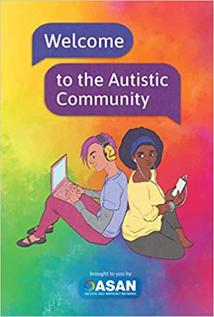
A motto of the self-advocacy movement is “Nothing About Us, Without Us!”. Lots of people talk about us without letting us talk. We should always be part of the conversation, and be in charge of our lives.
The Autistic Self Advocacy Network. Good to read resources from within.
We’ve traced the call. It’s coming from inside the house!
– brought to you by the letter E, for Echolalia
More seriously, it’s an interesting (and quick (and free)) read. Worth learning a bit more about what autism is (and isn’t). It certainly gets a bit repetitive at times and there was a large part that wasn’t new to me–but your milage will almost certainly vary.
If you or someone you know or care about is autistic, it’s probably worth a read.
Some more notes as I read:
“People with autism” is an example of person-first language. “People with disabilities” and “people with intellectual disabilities” are other examples of person-first language.
People can choose the words they like to be called. Many people with intellectual disabilities like using person-first language, and they’ve used person-first language for a long time. They want others to know that they are a person, and that their disability is only one part of them.
A lot of Deaf people and autistic people like identity-first language. They feel like their disabilities are a big part of who they are, and want others to know that their disability is important to them.
It’s nice to see it laid out. I feel this may also fall into the ‘why is this relevant’ attitude that at least some autistic people have. And there I just did it without thinking. Interesting.
Most developmental disabilities are there when someone is born. Autistic people are born autistic, and we will be autistic for our entire lives. An autistic person never stops being autistic.
And yet finding professional support for adults is… interesting to say the least. I wonder if this book will cover that.
Some autistic people can’t stop caring, even when we don’t want to. We might feel really bad if we throw a toy away, since it can feel like we’re hurting the toy’s feelings. If we see someone who is hurt or embarrassed, we might feel the same way.
And it’s really hard to explain (even to oneself) why you might not want to throw something away. Especially if it isn’t consistent.
All of this can change how autistic people talk. For example, many autistic people can’t control our voices. We may talk too loud or too soft, or mumble or sound like we’re singing when we talk.”
… having to work to speak reasonably loud can be an autism thing. Huh.
Echolalia means repeating things that you have heard before. For example, you might repeat lines from your favorite movie out loud.”
And people never seem to get the references. 😄
(Space Jam – “hanging on! hanging on! hanging on!”)
People with red hair sunburn more easily. Sunburns hurt and can cause skin cancer, but we don’t say that red hair is bad. We don’t try to cure red hair, or tell people with red hair to dye their hair. That wouldn’t help with their sunburns. Instead, we make sure people wear sunblock.”
Immediate response: What about red headed people with autism?
More useful response: a good analogy.
In the year 2000, doctors said that about 1 in 150 people were autistic. Right now, they think 1 in 59 people are autistic. This isn’t because more autistic people are being born. It’s because doctors are getting better.
I do wonder if there’s more likely a bit of both. Is it actually proven autism is solely genetic? There are so many different environmental changes over the centuries. Although the distance between environment causing autism versus revealing autism is interesting as well.
A lot of the things that are hard for autistic people aren’t hard because of autism. They are hard because of other people.
This strikes me as unintentionally amusing. 😄
A good point though.